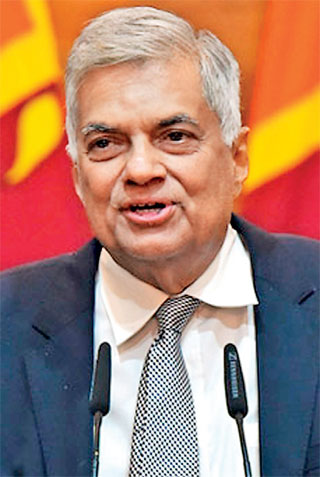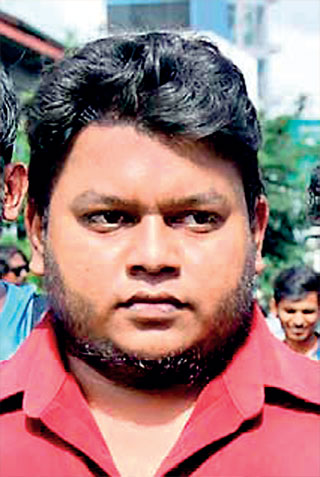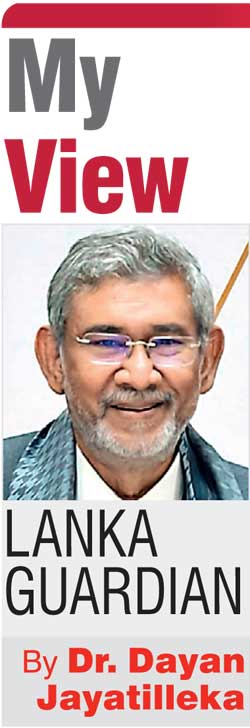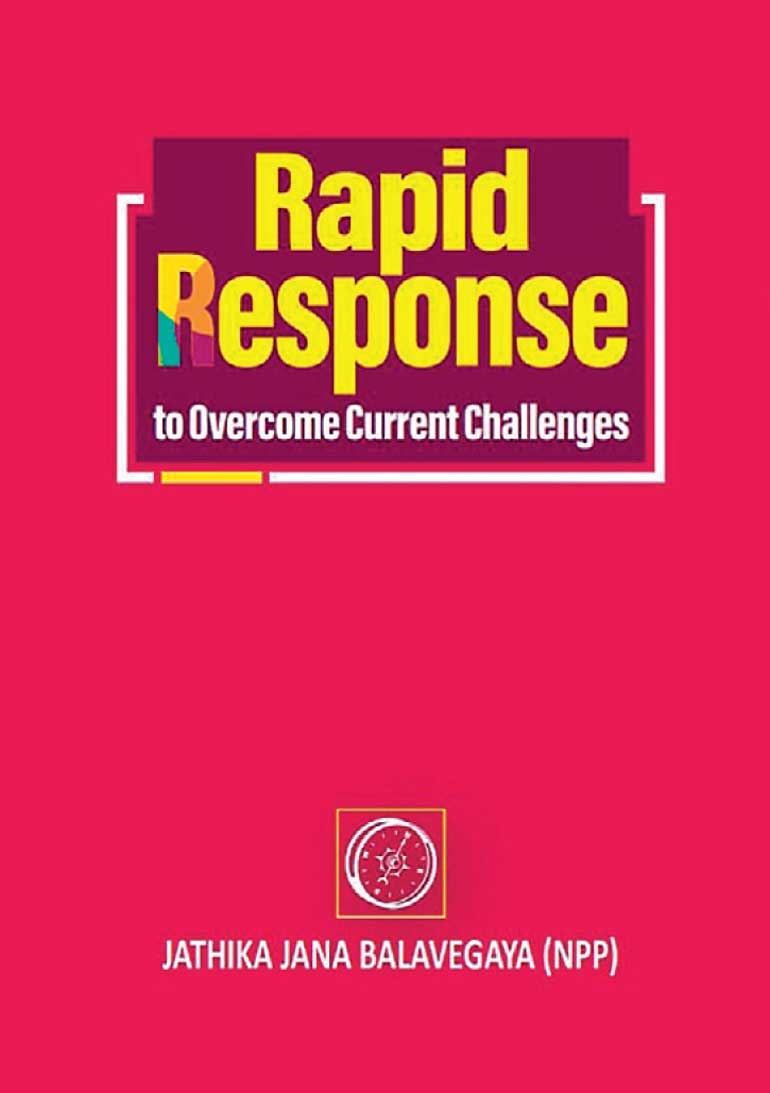Monday Feb 16, 2026
Monday Feb 16, 2026
Thursday, 2 February 2023 01:29 - - {{hitsCtrl.values.hits}}

President Ranil Wickremesinghe

Wasantha Mudalige

Anura Kumara Dissanayake
|

On our 75th Independence Day we should salute Wasantha Mudalige, student leader, political prisoner and freedom-fighter; a people’s champion and true patriot who fought fiercely and non-violently at the frontline of an Aragalaya which was armed only with the Sri Lankan national flag, to liberate us from the rule of an arrogant, agriculture-destroying President and the family-based oligarchy he fronted—and in the most basic sense, won (though that victory is unfinished and must be taken to completion). Rightly freed by the Colombo Magistrate’s court from a state frame-up under the PTA, he is the emblematic national hero of our 75th Independence Day.
We must also honour the heroic (‘Veera’) Puran Appu, whose anti-imperialist rebellion in 1848 was sparked by unbearably burdensome taxes imposed by a foreign authority.
Furthermore, we must recall the slogan “no taxation without representation” which was the basis of the first democratic revolution, the American Revolution and War of Independence of 1776. We must remember it when we face the tax burdens imposed by a ruler we did not elect and therefore does not represent us, and a Cabinet dominated by a ruling party which has forfeited the platform it was elected on and thus no longer represents us, in agreement with foreign decision-makers we did not elect and therefore do not represent us.
As Sri Lanka celebrates 75 years of independent existence, it is led for the first time ever, by someone who was neither elected popularly to the post of the country’s leadership nor to the legislature. Our leaders have always been popularly elected and in the one exceptional instance after the assassination of a president by the LTTE, it was an elected member of the legislature whose party constituted the majority in Parliament, who took over the reins of leadership.
Never has the form and scale of our celebration of Independence as a state, a country, been so unsupported by public sentiment. Never before has there been a proliferation of parallel protests, in the shadow of the threat of surveillance and suppression (which includes helicopters and drones) by the state apparatus.
Never in 75 years has there been less of a consensus between the citizenry and the governing elite; never have ties binding them been so frayed.
 Ranil’s ‘Delft Speech’
Ranil’s ‘Delft Speech’
When Ranil Wickremesinghe who notes remonstratively that the 13th Amendment has been around for 37 years, was elected PM in 2001-2003 and 2015-2019, he never once tried to secure the full implementation of the 13th Amendment for which he could have easily secured the support of Presidents Kumaratunga and Sirisena. Instead, he pushed proposals which went beyond 13A and attempted to delete the unitary state itself.
The 13th Amendment cannot be implemented at all—let alone fully—unless the Provincial Councils are activated, and those can be activated only if they are elected, and they can’t be elected because in 2015-2019 Ranil as PM gummed up the electoral law for fear of losing the PC elections by inserting 23 pages of amendments at the committee stage of a bill.
As President he has not said a word about removing that mess and holding an election to the Provincial Councils, still less a time-frame for doing so.
The main reasons for non-implementation/partial implementation are:
1. The LTTE waged all-out war which made implementation of 13A by President Jayewardene and Premadasa (the latter had introduced it in Parliament) impossible on the ground.
2. President Chandrika Bandaranaike Kumaratunga by-passed 13A and moved in a federal direction with her ‘union of regions’ package.
3. The Tamil parties rejected 13A even as start-line for talks and disdained pushing for its implementation.
4. President Mahinda Rajapaksa was undecided about full implementation and inclined against it.
5. President Gotabaya Rajapaksa was opposed to the 13th Amendment and provincial/territorial devolution.
That said, an intense economic crisis and an unelected President is the most incendiary combination of moment and agency to fully implement 13A. Only a triad of an elected President, freshly-elected Parliament and elected Provincial Councils has the legitimacy to do so. We certainly can “remain in a middle position” until then.
Ranil has just repeated the classic error of the Lankan leader who he is most similar to and whose advisor was Ranil’s father Esmond Wickremesinghe: Sir John Kotelawala who in 1956, an election year, pledged at an event on the island of Delft, “parity of status for the Sinhala and Tamil languages”.
The stand was the correct one, but that proved profoundly irrelevant as well as counter-productive because the timing, context and individual articulating it were all wrong. The result was the defeat of the UNP administration, Sir John’s self-exile in Kent, and the opportunistic reactive switch to the track of majoritarian chauvinism on the part of SWRD’s SLFP. The exact opposite of what Sir John promised in Delft became enshrined as discriminatory, divisive state doctrine for decades: ‘Sinhala Only’.
1956 was the aberrant, not the inevitable product of the multiethnic Hartal ‘53. It is the choice of Sir John as tough, law-and-order successor, and his socially and nationally alienating profile and policies, that invited the injection of majoritarian chauvinism into the inevitable popular backlash. We had our Hartal 1953 in the Aragalaya 2022.
Ranil has set this vicious cycle in motion again, perhaps deliberately. In 1977-1983 the Jayewardene administration (which was advised by Esmond Wickremesinghe), built up racist Minister Cyril Mathew as counterpower to both the Opposition and the populist Prime Minister R. Premadasa. The racist card split the Opposition after Black July 1983, triggering a left-on-left civil war within the Southern civil war.
IMF worship
The problem is not AN agreement with the IMF; the problem is THIS opaque agreement – unknown to the Parliament and the people—by THIS unelected administration.
The rightwing economic policy oligarchy is wrong to insist that the present agreement arrived at with the IMF by an unelected ruler and his technocrats is the only road to recovery. If public sentiments are not reflected, factored-in as a reality, they will explode. There is no technocratic solution, only a democratic-realist one.
The problem lies in worshiping an IMF agreement as an icon instead of one track of a multi-track approach without which the modest funds offered by the IMF will only drive us back into the debt trap of the private money markets. Our dependence must be diversified.
Absurd Anuranomics: JVP-JJB’s ignorant confusion
It is an absurd fiction of rightwing economists ignorant of economic history and the history of ideas –including, obviously, Marxism—that parties with a Marxist, Marxist-Leninist or Communist formation (which includes a grounding in Marxist political economy) cannot create a prosperous economy. The Communist Party of China and the Communist Party of Vietnam are Marxist (as was Deng Xiaoping). The elected Communist coalition that runs Kerala, the state with the highest human development indicators on the subcontinent, is also Marxist.
The JVP-JJB is nowhere close to being a mature Marxist or Communist party. Nor is it a social democratic, progressive-populist formation such as that of Brazil’s Lula da Silva or Mexico’s Lopez Obrador. It is neither Asian Communist nor Latin American Leftist.
If the diagnosis is wrong the prescription cannot be right. The JVP-JJB’s diagnosis of the crisis is wrong. Its prescription is therefore wrong. If the JVP-JJB assumes office, we shall not have a 21st century social-democratic mixed economy (which we need), but a mixed-up economy born of mixed-up thinking.
Here is the conceptual core of the JJB (NPP’s) manifesto:
“Introduced in 1977, the Open Economic Policy has been destructive through its prioritization of personal gain over social responsibility. A clear indicator of the culture of greed this economic system has bred is how a select group of people benefits, and profit from fraudulent and corrupt business practices even in the face of the pandemic. This culture of greed and the destructive economic thinking that shapes it has also created a system of political power centred in the hands of a few…
This economic policy laid the foundation for the severe economic crisis that we face today. Instead of prioritizing and strengthening production, the key features of this policy are the unnecessary expansion of financialization, austerity measures subsidy cuts, creating market monopolies, inefficient and excessive borrowing, and sale of public property and state-owned enterprises to a small coterie of favoured individuals and companies. This policy, which gradually evolved, is called neoliberalism. Its operation, alongside globalization, allowed the domination of financialization and created an artificial financial market that created economic bubbles, deviated from commodity production…”
(‘A Thriving Economy Instead of a Dependent Economy’, Rapid Response to Overcome Current Challenges, Jathika Jana Balavegaya/NPP, pp 4-6.)
While denouncing “successive governments that have ruled Sri Lanka in the last few decades” the JJB fails to condemn the economic policies of “successive governments that have ruled Sri Lanka” BEFORE the “last few decades”, such as those which generated the 1947 General Strike, the Hartal of 1953 and the General Strike of 1976-’77.
Sri Lanka’s 1977 model open economy certainly needed re-balancing and rectification, which is what President Premadasa did with his ‘growth with equity’ strategy, fusing multi-pronged social upliftment programs with decentralised rapid industrialisation program. The latter was exactly the “commodity production” that the JJB manifesto erroneously claims the country deviated from since the 1977 open economy. Premadasa’s industrialisation drive has been upheld as exactly what Sri Lanka needs today by Prof. Howard Nicholas who lectures in Vietnam and whose mastery of Marx’s economic theory dwarfs that of the JVP leadership and its JJB (NPP) academic and intellectual front.
Rohana Wijeweera and I became deadly foes but he was way better-read and brainier than the current JVP-JJB. His analysis of the crisis of Sri Lanka’s economy spoke to historico-structural causes. He emphasised that Sri Lankan capitalism did not evolve of its own internal dynamics from feudalism but was superimposed by colonial coercion. The plantation-dominated colonial capitalist formation had family clans as nodes. This was the root of backwardness and crisis.
By contrast, the crude analysis of the JJB led by JVP leader Anura Kumara Dissanayake begins with 1977:
“Introduced in 1977, the Open Economic Policy has been destructive through its prioritization of personal gain over social responsibility.”
The JJB’s logic implies that:
(a) The economic policy that prevailed before the 1977 open economy was better by comparison and was so to such an extent that no critical mention of it is necessary.
(b) The logic of the economic policy that preceded the open economy of 1977 was NOT the “prioritization of personal gain over social responsibility.”
|
Capitalism as a system is marked precisely by “the prioritisation of personal gain over social responsibility”. Therefore, one can only conclude that for the JVP-JJB, the pre-1977, pre-open economy period from 1948 was a non-capitalist economy of some sort. This is silly.
“A clear indicator of the culture of greed this economic system has bred is how a select group of people benefits, and profit from fraudulent and corrupt business practices even in the face of the pandemic.” (Ibid)
For the JJB, the 1977 open economy is not a policy regime or model but an “economic system” –as capitalism and socialism are—which it is not.
Why does the JVP-JJB think that the people electorally decimated the managers of the economic model that preceded the 1977 open economy, wiping out the LSSP and never returning Sirimavo Bandaranaike as the leader of the country?
Why did the electorate keep out the SLFP for 17 years until Chandrika came along and credibly convinced the electorate of her conversion to the 1977 open economy, albeit with ‘a human face’?
Why did the people keep successive UNP administrations practicing the open economy, in office for 17 years?
Could it possibly be because in 1970-1977 there was semi-starvation and people were rooting in dustbins, picking out papaya skins to eat? How can the JVP-JJB be unaware or uncritical?
What had Gotabaya’s ruinous fertiliser ban to do with the open economy of 1977? Was it not exactly the opposite, a reversion to the Sirimavo-NM closed economy of pre-1977 which the JVP-JJB refuses to remark on critically?
For the JVP-JJB, the ‘open economy’ is synonymous with ‘neoliberalism’, which of course it is not.
“…This policy, which gradually evolved, is called neoliberalism. Its operation, alongside globalization…” (Ibid).
A literate Marxist party would not conflate the ‘open economy’, ‘globalisation’ and ‘neoliberalism’. China’s and Vietnam’s economies, as well as those of East Asia in general are open economies, but hardly fit the description of neoliberalism in which the state plays a minimalist role.
For Anura Kumara Dissanayake, the ‘open economy’ a.k.a ‘neoliberalism’ operates ‘alongside globalisation’. Marx and Engels were the first to recognise capitalism as a truly global and globalising economic system. The Communist Manifesto (1848) is the best description and tribute to the globalisation that is inherent in capitalism. It was not the ‘globalisation’ aspect of capitalism that Marx and Engels critiqued, combatted and sought to overthrow. Globalisation is a process that is centuries old. Neoliberalism is a policy has been in operation only for a few decades.
The problem for any Marxist, rational radical or lucid leftist is not ‘globalisation’ as such—which has President Xi as a determined champion—but a specific mode of globalisation, i.e., unipolar and neoliberal globalization.
The conceptual blunders of the JJB’s policy document cannot be written-off as those of the JJB rather than the JVP leadership. AKD leads both the JVP and the JJB (which he founded). The JVP’s brightest ‘theoretician’ Bimal Ratnayake tells our sister paper:
“…Social market economic theory is nothing but propaganda carried out by the German Social Democratic Party at that time. It was an invention to implement capitalism under the garb of socialist policies…”
That’s ignorant nonsense. The ‘social market economy’ was NOT ‘propaganda carried out’ by the German Social Democratic Party (SDP) but precisely by its centre-right rival, the ruling Christian Democratic Party (CDU) and its leader Konrad Adenauer. The anti-socialist CDU wasn’t interested in hiding the implementation of capitalism which it proudly championed, ‘under the garb of socialist policies’.
The root of the JVP-JJB’s problem is ignorance, starting at the top. As Karl Marx exclaimed, slamming the table with his palm while responding to the communist and tailor Joseph Weitling at a meeting of the First International, “ignorance has never helped anyone yet!”
Given the JVP-JJB’s damning of the 1977 open economy and preference for the pre-open economy/non-open economy, in contradistinction to a re-balanced open economy as practiced by the Latin American Left, will Sri Lanka not slide back to the closed economy of 1970-1977 or worse, if the JVP-JJB governs?
When that happens, the JJB may govern but the JVP will rule. It will be the JVP’s Politbureau/Central Committee machine (‘apparat’) with its tightly integrated collective leadership core, doctrinal blinkers, opaque selection and closed-door decision-making, that calls the shots, marginalising the JJB front organisation with its fellow-travellers and incrementally installing totalitarian control in place of an open economy and an open society.